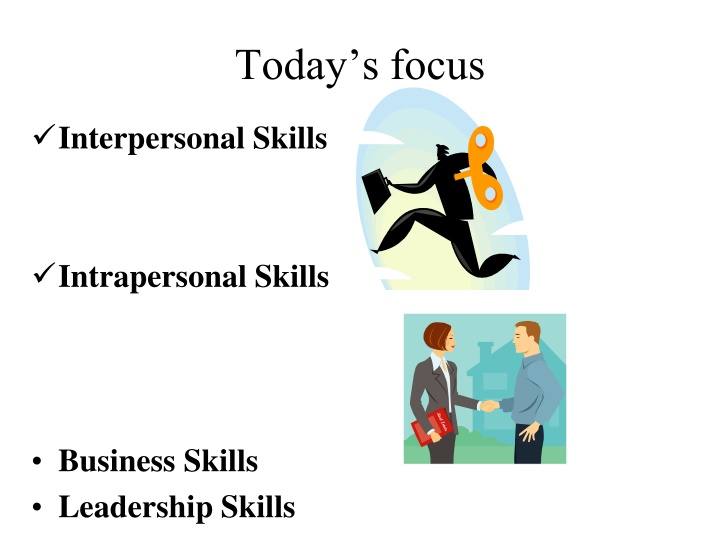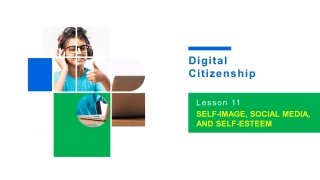
Developing Interpersonal and Intrapersonal Skills Through Self-Awareness
Enhance your interpersonal and intrapersonal skills by cultivating self-awareness. Discover how self-awareness is taught, the benefits of becoming self-aware, the components of self-awareness, and the distinction between self-awareness and self-monitoring. Improve your performance, manage stress, and enhance communication by leveraging self-awareness effectively.
Download Presentation

Please find below an Image/Link to download the presentation.
The content on the website is provided AS IS for your information and personal use only. It may not be sold, licensed, or shared on other websites without obtaining consent from the author. If you encounter any issues during the download, it is possible that the publisher has removed the file from their server.
You are allowed to download the files provided on this website for personal or commercial use, subject to the condition that they are used lawfully. All files are the property of their respective owners.
The content on the website is provided AS IS for your information and personal use only. It may not be sold, licensed, or shared on other websites without obtaining consent from the author.
E N D
Presentation Transcript
Todays focus Interpersonal Skills Intrapersonal Skills Business Skills Leadership Skills
To develop interpersonal & intrapersonal skill you have to become SELF AWARE How is it taught? Why become self aware? What is self awareness What to become aware about? How to make the self awareness process valuable for yourself ?
How Self Awareness is taught Reading Self Assessment Discussion 1. Hogan & Warrenfeltz (2003). Educating the Modern Manager 1.Own assessment of inter- and intrapersonal skills Concepts 2. Descriptions of Big- 5 Personality Dimensions 2. Someone else s assessment of your inter and intrapersonal skills 3. Learning from Inventories 3. Big Five Personality Dimensions
Why become self aware? To improve performance (Church, 97) To develop intrapersonal skills To manage yourself by setting appropriate goals, choose appropriate careers, manage stress To accept your tendencies of behaving, thinking & feeling bec 30% of personality is genetic To develop interpersonal skills Understand differences between you and others Understand why others react to you the way they do Adapt your communication behaviors to others reactions Human et al 1999, Janasz et al
What is self awareness Ability to assess one s personality, behaviors & skills accurately by Observing one s own thoughts, behaviors, skills, using validated, structured questionnaires Comparing observations to an external source (e.g., a standard or known other or first impression of other) Incorporating comparison into self observation & subsequent behavior Ex from Bass & Avolio, 90; Learning from Inventories, Marcic et al, 310, Wicklund, cited in Atwater & Yammarino, 1992
What is confused with self awareness? Self monitoring Extent to which you monitor, regulate, control yourself in social situations E.g., a high self monitor may deceive people by being friendly when s/he really dislikes them Low self monitors behave according to their own inner states whereas high monitors behave according to the social situation
Self Monitoring vs. Self Awareness Describe a concrete behavioral example that illustrates the difference and similarity between these two concepts
Self monitoring vs. self awareness Knowing oneself is different from being able to changeone s behaviors in the presence of others Self-monitoring is part of self-awareness
What should leaders become self-aware about? Intrapersonal Skills Interpersonal Skills Self Monitoring Attitudes toward authority Self Control Social Skills Self Esteem
Do you already have this awareness? In the pre-requisites to this course (b23, b29, b27) you became self aware of your Personality But you did not compare with another s perspective of you and They were not specific to leadership skills
Review: What is Personality A person s tendency toward thinking, behaving and feeling in consistent ways across different types of situations & across time Review of B23
Examples of Personality Extraversion Gregariousness (talkativeness), friendliness, assertiveness, activity level, excitement seeking, cheerfulness Agreeableness Sympathy, Trust, Morality, Altruism, Cooperation, Modesty Review of B23
How is behavior different from Personality? Behavior Can be observed/measured all the time E.g., Talkativeness in social situations is extraversion vs. talkativeness in non social situations is not Is influenced by personality & other factors E.g., Talking in class is determined by personality and reinforcement in class whereas talking across different social situations is determined by personality
Personality vs. Skill Personality Relatively more stable across time and situation Relatively genetic More abstract (higher level) Skill Changeable/malleable Learned More concrete (lower level) e.g., Interpersonal Skill Part of Extraversion + part of Agreeableness + Conscientiousness e.g., Extraversion e.g., Agreeableness e.g., Conscientiousness
Personality vs. interpersonal skills? Interpersonal Skills Conscientiousness Extraversion Self Monitoring Self Control Social Skills Agreeableness
So how does personality map onto intra and interpersonal skills? Intrapersonal Skills Interpersonal Skills Conscientiousness Extraversion Attitudes toward authority Self Monitoring Self Control Self Esteem Social Skills Emotional Stability Agreeableness Agreeableness
Back to What should leaders become self-aware about? Intrapersonal Skills Interpersonal Skills Self Monitoring Attitudes toward authority Self Control Social Skills Self Esteem
Self Control: A Facet of Conscientiousness Conscientiousness Intrapersonal Skills Interpersonal Skills Self Control Validity: Related to career outcomes
Self Control Definition Impulse control Persistence On task; on others expectations Low risk seeking Low self centeredness Ability to Control Temper
Self Monitoring vs. Self Control Describe a concrete behavioral example that illustrates the difference and similarity between these two concepts
Back to What should managers become self-aware about? Intrapersonal Skills Interpersonal Skills Self Monitoring Attitudes toward authority Self Control Social Skills Self Esteem
Social Skills: A facet of Agreeableness & Extraversion Interpersonal Skills Extraversion Intrapersonal Skills Social Skills Agreeableness
Definition of Social Skills Able to read others accurately Make favorable first impressions Adapt to a wide range of social situations Be persuasive Baron & Markman 2000
ButSocial Skills are only part of Interpersonal Skills Social Skills Self Control Self Monitoring Intrapersonal Skills Interpersonal Skills
Interpersonal Skills Initiate, build, maintain Social Skills Put oneself in the place of another person and try to understand what the person expects in an interaction Self-monitoring Incorporate information about other person s expectations in one s subsequent behaviour e.g., Regulating oneself when interacting with supervisor Self Control Stay focused on the other person s expectation E.g., supervisor s expectation of being treated with respect
Social Skills vs. Interpersonal Skills Describe a concrete behavioral example that illustrates the difference and similarity between these two concepts
Whats next.. Why become self aware What is self awareness What to become aware about? How to make the self awareness process valid (i.e., useful) for yourself ?
How to make the self awareness process valid Why measure interpersonal/ intra personal skills? Why should you trust the scores on the inventories you completed in this course? Why should you obtain some else s assessment of your interpersonal & intrapersonal skills? Why may there be such discrepancies between your own vs. another s view of your inter and intra personal skills How will you go about narrowing such discrepancies?
What you learned today--I Why become self aware To improve performance, manage career, improve interpersonal interactions What is self awareness Knowing about yourself via feedback from self/peers/others and changing yourself appropriately
What you learned today--II What to become aware about? Personality, interpersonal & intrapersonal skills How to make the process of self awareness valuable for you? Take valid surveys, compare your perception to another s perception
Sample Question for Final How are inter-personal and intra-personal skills similar and different from each other Use an example to illustrate How is self-control different in the intra- personal vs. inter-personal context






















